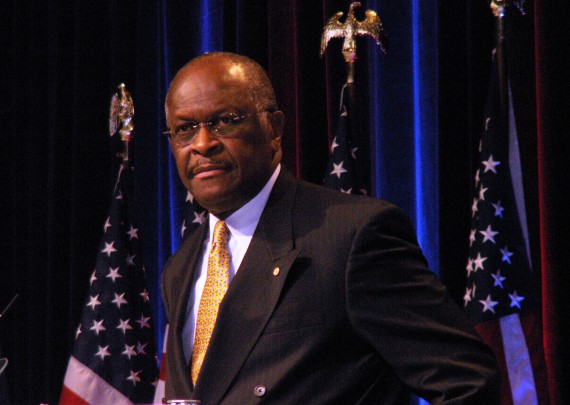Herman Cain: Gun Control A “States Issue.” Huh?
When I saw Herman Cain’s interview with Wolf Blitzer yesterday afternoon, this immediately jumped out at me:
BLITZER: How about gun control?
CAIN: I support the 2nd amendment.
B: So what’s the answer on gun control?
C: The answer is I support, strongly support, the 2nd amendment. I don’t support onerous legislation that’s going to restrict people’s rights in order to be able to protect themselves as guaranteed by the 2nd amendment.
B: Should states or local government be allowed to control guns, the gun situation, or should…
C: Yes
B: Yes?
C: Yes.
B: So the answer is yes?
C: The answer is yes, that should be a state’s decision.
Transcript via Jazz Shaw
This is, of course, entirely incorrect. In McDonald v. Chicago, the Supreme Court ruled that the 2nd Amendment, and its protections as had recently been defined in District of Columbia v. Heller, applied to the states through the Due Process Clause of the 14th Amendment. While the decisions in McDonald and Heller do leave unanswered the question of what forms of firearms regulation would be Constitutionally acceptable, it is fairly clear that the protections of the Second Amendment are applicable to the states.
Now, it’s possible, as Jazz Shaw suggests, that Cain simply misspoke under Blitzer’s rapid fire barrage. The other possibility, though, is that he’s one of those “Constitutional” conservatives who rejects the entire idea that Federal Bill of Rights should be applied to the states. Ron Paul believes this, and it’s one reason I’m not entirely a fan of his. Is this Cain’s position? Does he believe that, not just the 2nd, but also the 1st, 4th, 6th, 7th and 8th Amendments shouldn’t apply to the states? Some clarification on this issue would be most helpful.







I gotta say, it seems he’s right. The states have a great deal of say on 2nd Amendment issues — on things like licensing, reciprocity with other states, open carry vs. concealed carry, and whatnot. The Chicago case said that the states can’t simply shut down the 2nd Amendment, but they have exercised restraints on it.
J.
If he’s an anti-incorporationist, at least he’s more consistent about it than (for instance) Ron Paul, who seems to think that the Second Amendment is the ONLY one incorporated.
While I don’t agree with the anti-incorporationist viewpoint, Paul’s position is consistent. The second is stated as a blanket restriction (“the right … shall not be infringed”) while the first is stated as a restriction only on congress (“congress shall pass no law”).
I’m with Jay Tea on this one. It seems like he’s just stating the status quo–states can have their own regulations (concealed carry, open carry, etc.), as long as they don’t blatantly violate the 2nd amendment.
” Ron Paul [rejects the entire idea that Federal Bill of Rights should be applied to the states], and it’s one reason I’m not entirely a fan of his.”
It’s a shame so many people are confused over the nature of our government. Fifty independent sovereign states got together and formed a republic governed by a central, federal entity. In doing so, they gave up some of their sovereign rights. However, we are still a republic of independent governments. I don’t understand why people are so confused over the first words of the First Amendment, “Congress shall pass no law…” The Constitution restricts the federal government, not the states. Thomas Jefferson himself believed that states were well within their rights to limit speech, the press, etc. I think he had a pretty good idea of the government created. Sadly, many Americans do not.
So, you don’t believe in the Constitution? @Thomas nailed the answer here. 50 sovereign, independent states got together to create a Federal government and to delegate some of their powers to it as their agent. In theory, the Constitution, including the Bill of Rights, is the “contract” that governs the behavior of the agent. The states are still sovereign and theoretically federal law should only take precedent over state law in the areas corresponding to the 18 enumerated powers.
SCOTUS opinions have wandered away from that view. But SCOTUS opinions have also given us a monster federal government where the creators, the states, are somehow subservient to the created, the federal government, in areas that were never delegated to the feds. BTW, the whole idea of the SCOTUS, an arm of the federal government handing out opinions about whether something is or is not Constitutional is in fact extra-Constitutional. There is no support for it within the Constitution itself.
Now, all that said, if we are going to play the incorporation game, as a matter of principle, we need to incorporate everything. No picking and choosing what can or cannot be incorporated. But from all the reading I have done, Ron Paul’s view is actually the correct one.
Are any of you people familiar with the Fourteenth Amendment?
Well, Timothy, I don’t think we’ve ever been formally introduced, but yeah, I’ve heard of it.
Are you saying that, thanks to the 14th, all state regulations of firearms as cited in this discussion are null and void? I think I might go for that, but I’d want to give it some careful consideration. It’s a hell of a big step.
J.
Yeah, Timothy. Are you? Highly doubtful.
@Jay Tea
I don’t disagree, my comment was directed at the people rambling about how incorporation is unconstitutional and how states are still sovereign despite lacking every criteria necessary to be called sovereign.
Oh, OK, Timothy. I saw that diversion and just ignored it.
J.
Well then, Timothy, you are ignorant.
Well, Thomas, why don’t you enlighten me then?
Well you’re the one who came here with your drive-by question without any specificity. So why don’t you do the enlightening? I’d love to hear your argument, if you can articulate one.
So far, silence. You have done nothing to refute any argument nor have you done anything to explain yours.
No State shall make or enforce any law which shall abridge the privileges or immunities of citizens of the United States; nor shall any State deprive any person of life, liberty, or property, without due process of law; nor deny to any person within its jurisdiction the equal protection of the laws.
…
The Congress shall have power to enforce, by appropriate legislation, the provisions of this article.
Fantastic, mantis. That selection does nothing to suggest incorporation or that destroys the very fabric of this republic’s founding.
Wrong, in so many ways.
State laws violating the Right to Keep and Bear arms are unconstitutional.
The same as a State law violating Freedom of the Press, or The Right to be Secure in your person and papers.
A state does not have the right to punish you without trial or to make you testify against yourself.
The Bill of rights are the Supreme Law of the Land.
The 2nd Amendment is the Law of the Land. As are they all.
When states ratified the Constitution they agreed to accept it as the Law of the Land.
Most states also stated an agreement on the right in their own constitutions.
Unless you believe that states have the right to prohibit Free Speech, or the constitutional protections against self incrimination or Search and Seizure,or the right to a trial.
Perhaps States can quarter Troops in your home too?
It applies to all. You can’t just pick and chose.
Just b/c the court rules a certain way does not mean Cain is wrong to say it SHOULD be a state matter. In fact, I think he is right, it should be a state matter.
AND I think the Court got it wrong in McDonald: the Biill of Rights applies only to the feds, not to the states. But in any case whatever positive law is does not affect what one’s normative views might be.
“Just b/c the court rules a certain way does not mean Cain is wrong to say it SHOULD be a state matter”
Are you insane or a liberal?
Or a little from column A and a little from column B?
Take ANY of the other natural rights guaranteed in the Constitutions Bill of Rights, like speech, religion, fair trial, search and seizure, et cetera, and tell yourself in the mirror with a straight face these INALIENABLE (not subject to statute, not able to be separate, transferable, or restricted in any way, exclusive right of the sovereign individual, without border) RIGHTS are allowed to regulated by the states…and if you can do it, you’re a statist.
END OF STORY.
Rights are not up for a vote, EVER! This isn’t mob rule democracy, it’s a CONSTITUTIONAL Republic!
CC: “Are you insane or a liberal?”
Libertarian. It is highly likely you are more lefty than I am.
“Take ANY of the other natural rights guaranteed in the Constitutions Bill of Rights, like speech, religion, fair trial, search and seizure, et cetera, and tell yourself in the mirror with a straight face these INALIENABLE (not subject to statute, not able to be separate, transferable, or restricted in any way, exclusive right of the sovoereign individual, without border) RIGHTS are allowed to regulated by the states…and if you can do it, you’re a statist.””
I’m not a statist. I think the state is criminal. The rights int he Constitution did not apply to the states (are you aware that Congregationalism was the official religion in Massachussetts in 1791? http://www.stephankinsella.com/2009/12/state-and-religion/ ). They limited the feds. Nor are they inalienable or absolute: the statist courts say you can abrogate these “rights” if the state shows a “compelling” need (to its own courts: neat),